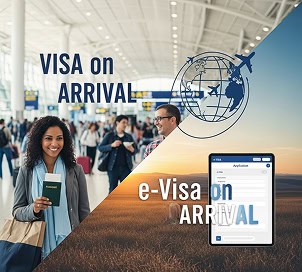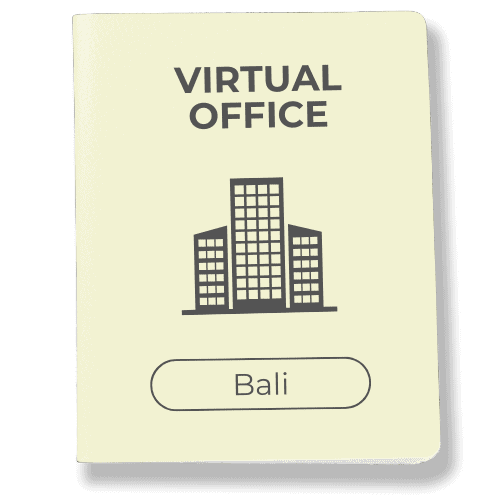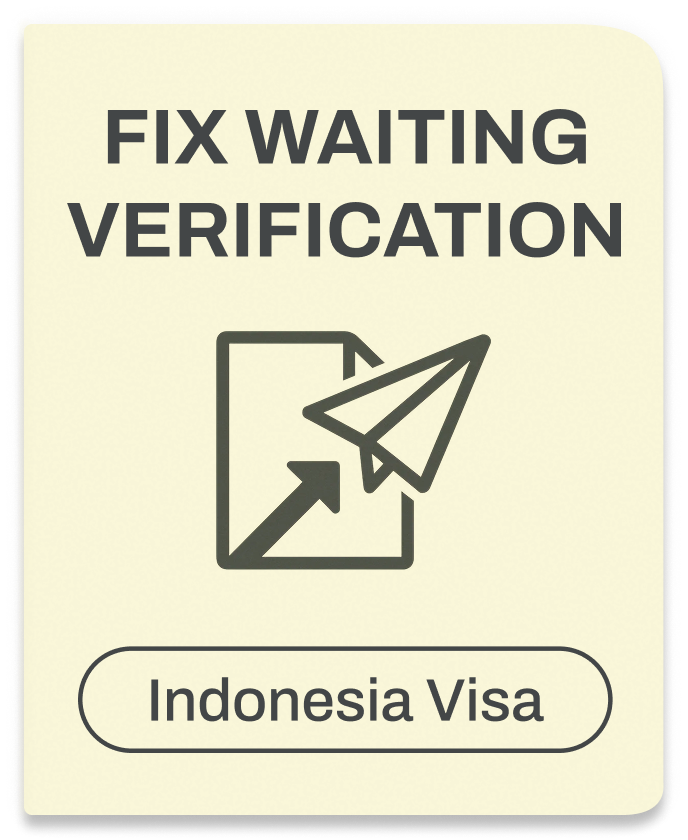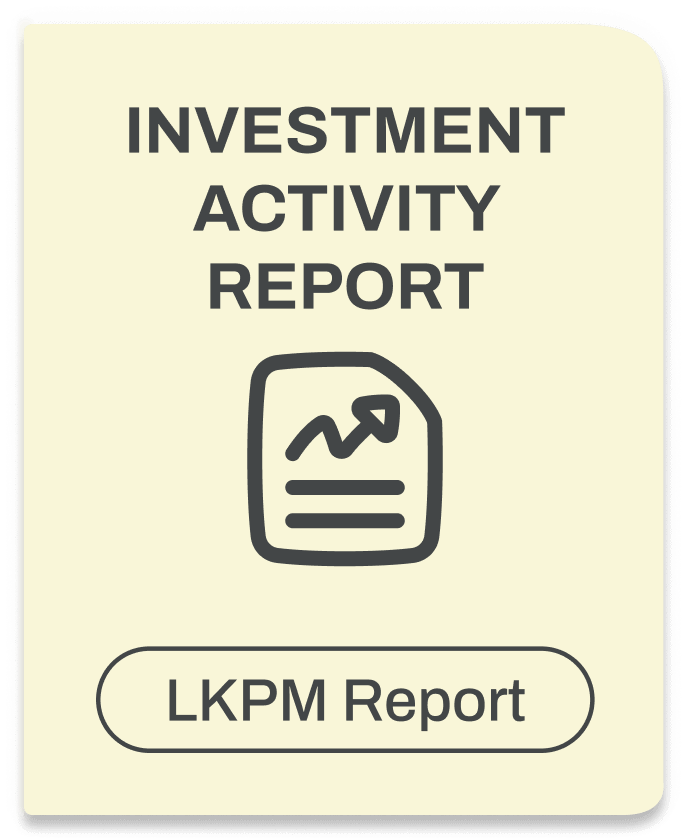Visa Kedatangan Indonesia untuk Keluarga 2026: Baca Ini Sebelum Anda Terbang
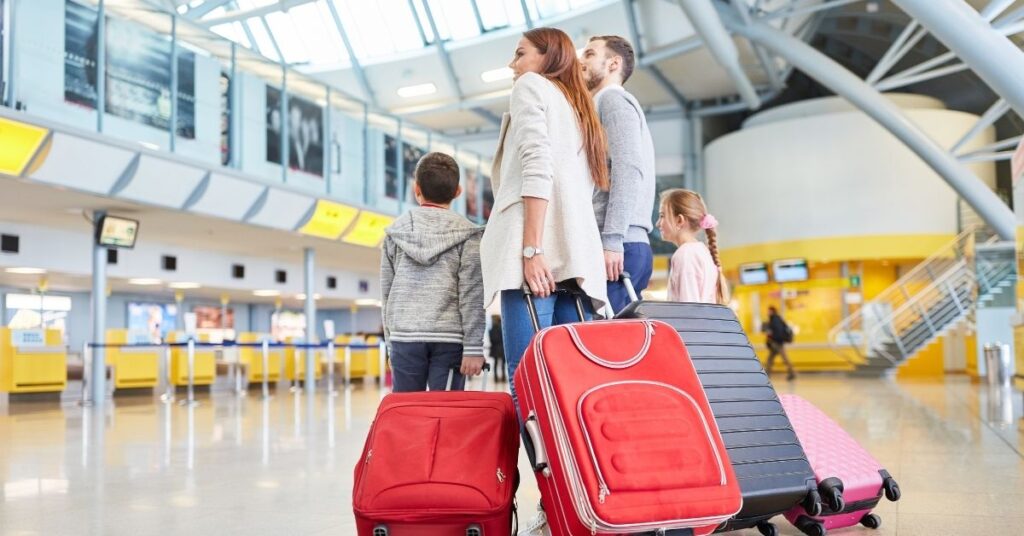
Mengajukan permohonan untuk visa pada saat kedatangan untuk keluarga sama dengan mengajukan visa reguler pada saat kedatangan. Satu-satunya perbedaan adalah jumlah, karena setiap orang membutuhkan visa mereka sendiri, termasuk bayi. Pada tahun 2026, biayanya Rp500.000 per orang untuk 30 hari, dan Anda dapat memperpanjangnya satu kali untuk 30 hari berikutnya. Anda dapat mengajukan permohonan secara online sekaligus dengan e-VOA, sehingga setiap anggota keluarga mendapatkan persetujuan mereka sendiri atau Anda dapat melakukannya di bandara jika Anda tidak keberatan dengan antrean.
Siapa yang harus mendaftar? Semua orang yang memiliki paspor, orang tua, remaja, anak-anak, dan juga bayi.
Yang sering terlewatkan oleh banyak orang adalah mereka menganggap visa orang tua mencakup keluarga, atau mereka lupa tiket lanjutan atau tiket pulang, alamat pertama di Indonesia, dan masa berlaku paspor yang masih enam bulan lebih. Mereka juga tidak memeriksa apakah nama di tiket sudah sesuai dengan nama di paspor anak-anak.
Teruslah membaca untuk mengetahui daftar periksa dokumen yang tepat dan alur pengajuan massal langkah demi langkah, sehingga semua orang dapat menyelesaikan proses imigrasi tanpa drama.
Persyaratan Masuk untuk Keluarga: Jawaban Singkatnya
Jika Anda hanya membaca satu bagian, jadikanlah ini sebagai bacaan utama:
- Siapa yang dapat menggunakannya: Sebagian besar warga negara asing dari negara yang memenuhi syarat memenuhi syarat untuk mendapatkan visa on arrival (VOA) atau visa elektronik (e-VOA). Periksa situs web imigrasi resmi sebelum Anda memesan penerbangan.
- Biaya dan durasi: Biaya visa adalah Rp 500.000 (sekitar $32 USD) per orang untuk visa sekali masuk yang berlaku selama 30 hari. Anda dapat memperpanjangnya satu kali untuk 30 hari lagi di kantor imigrasi setempat.
- Ya, bayi Anda juga membutuhkannya: Setiap anggota keluarga membutuhkan visa Indonesia mereka sendiri jika kewarganegaraan mereka mengharuskannya. Bahkan bayi berusia enam bulan. Bahkan balita. Tidak ada “bebas masuk untuk bayi”.”
- Dasar-dasarnya: Paspor Anda harus masih berlaku setidaknya enam bulan dari tanggal masuk. Anda membutuhkan setidaknya satu halaman kosong. Anda memerlukan bukti bahwa Anda akan meninggalkan Indonesia (tiket pulang pergi dengan nama semua orang di dalamnya).
- e-VOA vs VOA bandara: Dengan e-VOA, Anda dapat mendaftar secara online sebelum berangkat dan melewatkan antrean pembayaran. VOA reguler berarti Anda membayar di bandara saat mendarat. Keduanya berfungsi dengan baik untuk tujuan wisata. Yang satu lebih mudah untuk anak-anak yang lelah.
Itulah gambarannya. Sekarang, mari kita gali lebih dalam lagi sehingga Anda bisa melakukan hal ini.
Negara yang Memenuhi Syarat: Siapa Saja yang Sebenarnya Membutuhkan Visa?

Kewarganegaraan yang Memenuhi Syarat (Orang Tua & Anak)
Hal pertama yang harus dilakukan: apakah paspor Anda memenuhi syarat? Pemerintah Indonesia menawarkan visa on arrival bagi warga negara dari sekitar 90 negara. Daftar ini mencakup kewarganegaraan umum seperti Amerika Serikat, Inggris, Kanada, Australia, Estonia, Finlandia, Prancis, Jerman, Hongaria, Islandia, India, Irlandia, Siprus, Republik Ceko, Denmark, Ekuador, Filipina, Polandia, Portugal, Republik Korea, Qatar, Jepang, Yordania, Kuwait, Brasil, Brunei, Palestina, dan Peru.
Jangan berasumsi. Periksa daftar terbaru di situs web imigrasi resmi sebelum Anda memesan apa pun. Direktorat Jenderal Imigrasi selalu memperbarui daftar negara yang memenuhi syarat. Peraturan dapat berubah, dan Anda tidak ingin ada kejutan yang menyebabkan Anda ditolak masuk.
Memiliki keluarga dengan kewarganegaraan campuran? Kelayakan setiap orang bergantung pada paspor mereka, bukan tempat tinggal Anda atau tempat anak-anak lahir. Paspor Amerika Anda memenuhi syarat. Paspor Jerman pasangan Anda memenuhi syarat. Namun, jika nenek ikut serta dan dia berasal dari negara yang tidak ada dalam daftar, dia akan memerlukan jenis visa yang berbeda.
Anak-anak & Bayi
Di sinilah keluarga sering keliru: mereka mengira anak-anak bisa masuk secara gratis atau tidak memerlukan visa. Salah.
Peraturan untuk bayi berusia tiga bulan sama dengan peraturan untuk Anda. Jika kewarganegaraan mereka memerlukan VOA, mereka memerlukan visa sekali masuk sendiri. Jika mereka memiliki paspor, mereka membutuhkan visa yang sama untuk mencocokkannya. Tidak ada pengecualian karena mereka kecil dan lucu.
Mitos tentang “masuknya bayi secara gratis” tidak akan membantu Anda menghadapi petugas imigrasi.
Pengecualian & Kasus Khusus
Beberapa wisatawan tidak memerlukan VOA sama sekali untuk kunjungan singkat. Warga negara ASEAN, seperti mereka yang berasal dari Brunei, mendapatkan bebas visa masuk untuk pariwisata. Jika salah satu orang tua adalah orang Indonesia atau berasal dari negara ASEAN, mereka mungkin tidak memerlukan VOA, tetapi anggota keluarga lainnya tetap memerlukannya.
Di sinilah letak kesulitannya: jika ada satu saja anggota keluarga yang tidak memenuhi syarat untuk mendapatkan VOA, Anda tidak bisa meninggalkan mereka begitu saja. Anda harus mencari opsi lain untuk semua orang atau membuatkan visa yang berbeda untuk orang tersebut melalui proses pengajuan visa sebelum Anda pergi.
Berpikir untuk tinggal lebih lama dari total 60 hari? VOA mungkin bukan jawaban Anda. Pertimbangkan jenis visa lain untuk kunjungan keluarga, pertemuan bisnis, membeli barang, atau bahkan perawatan medis jika diperlukan. Visa turis memiliki tujuan yang berbeda dengan sistem hibah kedatangan.
E-Visa vs VOA: Proses Aplikasi Mana yang Harus Anda Pilih?
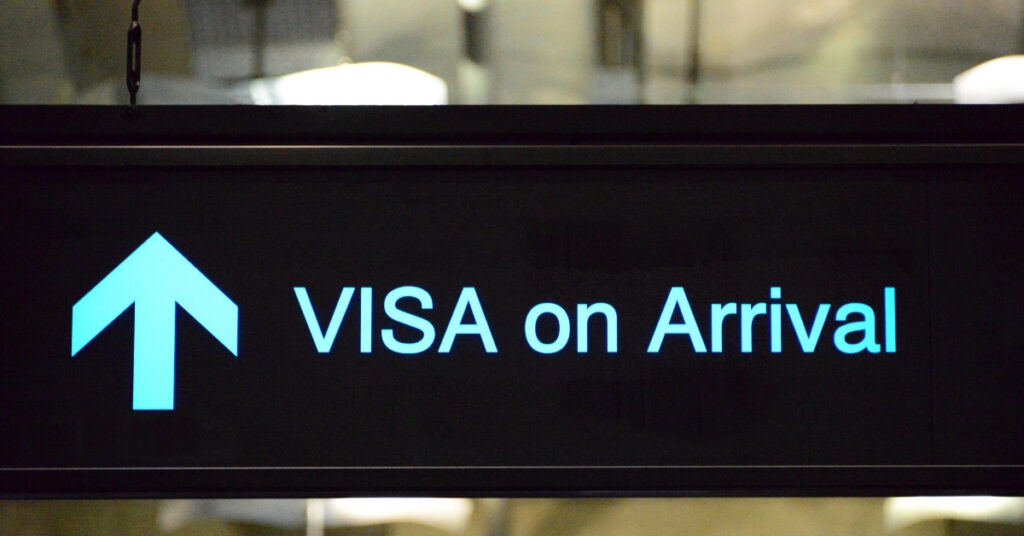
Apa itu e-VOA
e-VOA adalah versi elektronik dari visa on arrival. Anda mengajukan permohonan secara online sebelum perjalanan Anda melalui portal imigrasi resmi Indonesia. Anda membayar biaya layanan secara online menggunakan kartu kredit Mastercard, JCB, atau metode pembayaran lain yang diterima. Anda mendapatkan persetujuan dengan kode QR. Anda menunjukkan persetujuan tersebut kepada petugas imigrasi alih-alih membayar di bandara.
Peringatan besar: hanya gunakan situs web resmi pemerintah. Situs-situs penipuan bermunculan setiap saat, meminta lebih banyak uang dan terkadang mencuri informasi Anda. Situs yang sebenarnya dijalankan oleh imigrasi Indonesia. Jika sebuah situs terlihat terlalu menarik atau meminta lebih dari Rp500.000 per orang, kemungkinan situs tersebut palsu.
Pro & Kontra untuk Keluarga
Keuntungan e-VOA: Anda melewatkan antrian pembayaran di bandara. Saat Anda membawa kereta dorong, tas popok, dan balita yang rewel karena tidak tidur siang, melewatkan satu antrean saja sudah sangat berarti. Anda menangani pembayaran dan aplikasi online di rumah saat Anda tenang dan memiliki wifi. Tidak perlu meraba-raba kartu kredit saat anak Anda rewel.
Kekurangan e-VOA: Anda memerlukan informasi yang akurat di awal. Kesalahan ketik pada nomor atau nama paspor dapat menyebabkan masalah. Anda memerlukan koneksi internet yang stabil untuk menyelesaikan proses aplikasi. Jika Anda tidak nyaman dengan formulir digital, mungkin Anda akan stres.
Keunggulan VOA reguler: Sangat mudah. Mendarat, berjalan kaki ke konter VOA, membayar, dan pindah ke pos pemeriksaan kantor imigrasi. Tidak perlu perencanaan sebelumnya. Jika Anda memesan perjalanan di menit-menit terakhir atau Anda tidak suka mendaftar secara online, cara ini cocok untuk sebagian besar pelancong.
Kelemahan VOA biasa: Anda membayar dan diproses di bandara bersama seluruh keluarga Anda. Jika antrean panjang dan anak-anak Anda sudah selesai bepergian, Anda akan merasakannya.
Rekomendasi cepat:
- Ada balita, kereta dorong bayi, dan penerbangan jarak jauh di belakang Anda? Dapatkan e-VOA. Lewati antrian pembayaran.
- Memesan di menit-menit terakhir atau lebih suka yang simpel? VOA di bandara juga bisa digunakan jika Anda siap menghadapi antrian.
Persyaratan & Dokumen Visa Keluarga (Dibuat Sederhana)
Mari kita sederhanakan hal ini. Inilah yang dibutuhkan setiap orang dalam keluarga Anda untuk masuk ke Indonesia secara legal.
Untuk Setiap Anggota Keluarga
- Paspor berlaku selama enam bulan: Paspor Anda harus masih berlaku setidaknya enam bulan dari tanggal masuk ke Indonesia. Bukan dari hari ini. Dari saat Anda benar-benar tiba. Periksa semua paspor, termasuk paspor anak-anak. Hal ini berlaku baik untuk paspor biasa, paspor sementara, paspor darurat, dokumen perjalanan darurat, paspor orang asing, dokumen perjalanan orang asing, atau titre de voyage.
- Halaman kosong: Setidaknya satu halaman kosong di setiap paspor untuk stempel visa dan persyaratan masuk.
- Tiket pulang atau perjalanan lanjutan: Bukti bahwa Anda akan meninggalkan Indonesia. Bukti ini harus mencantumkan nama semua anggota keluarga Anda. Pemesanan hotel saja tidak cukup. Imigrasi ingin melihat bahwa Anda memiliki penerbangan atau transportasi lain untuk meninggalkan Indonesia dalam masa berlaku visa Anda.
- Foto seukuran paspor: Beberapa petugas imigrasi mungkin akan meminta hal ini, meskipun tidak selalu diberlakukan untuk VOA. Lebih baik memilikinya untuk berjaga-jaga.
Dokumen Ekstra Saat Bepergian dengan Anak-Anak
Perjalanan keluarga menambah lapisan dokumen. Memang menjengkelkan, tetapi diperlukan menurut hukum Indonesia.
Akta kelahiran atau kartu keluarga: Terutama penting jika anak-anak Anda memiliki nama belakang yang berbeda dengan salah satu atau kedua orang tuanya. Petugas imigrasi membutuhkan bukti bahwa Anda benar-benar memiliki hubungan keluarga.
Surat persetujuan: Jika hanya satu orang tua yang bepergian dengan anak-anak untuk kunjungan keluarga, bawalah surat yang diaktakan dari orang tua lainnya yang memberikan izin. Jika anak-anak bepergian dengan kakek-nenek, bibi, paman, atau teman keluarga, mereka pasti membutuhkan surat izin dari kedua orang tua.
Surat-surat penitipan atau perwalian: Orang tua yang berpisah atau bercerai harus membawa dokumentasi yang menunjukkan pengaturan hak asuh. Anda tidak ingin terjebak dalam menjelaskan hukum keluarga di pos pemeriksaan imigrasi.
Langkah cerdas? Bawalah salinan cetak dan digital dari semuanya. Simpan foto-foto dokumen perjalanan ini di ponsel Anda. Letakkan salinan fisik di tas jinjing Anda. Bukan di bagasi terdaftar, di mana Anda tidak dapat mengaksesnya.
Dokumen yang Harus Dipersiapkan Sebelum Anda Terbang
Persetujuan e-VOA: Jika Anda memilih jalur elektronik, siapkan email konfirmasi dengan kode QR di ponsel Anda. Unduhlah agar dapat digunakan secara offline. Periksa kembali apakah semua informasi sudah sesuai dengan paspor Anda.
Kartu Kedatangan Seluruh Indonesia: Indonesia kini mewajibkan pelaporan pabean secara digital melalui aplikasi atau situs web. Setiap orang dalam keluarga harus menyerahkannya sebelum kedatangan. Anda dapat melakukannya beberapa hari sebelum terbang.
Bukti akomodasi: Pemesanan hotel atau konfirmasi Airbnb Anda untuk tujuan wisata Anda. Imigrasi tidak selalu bertanya, tetapi mereka bisa.
Asuransi perjalanan: Tidak secara resmi diwajibkan untuk VOA, tapi serius, Anda bepergian dengan anak-anak. Dapatkan asuransi. Keadaan darurat medis di luar negeri dengan anak-anak bukanlah hal yang main-main, bahkan jika Anda tidak berada di sana untuk mendapatkan perawatan medis.
Langkah-demi-langkah: Cara Mendapatkan VOA sebagai Keluarga (Alur Bandara)
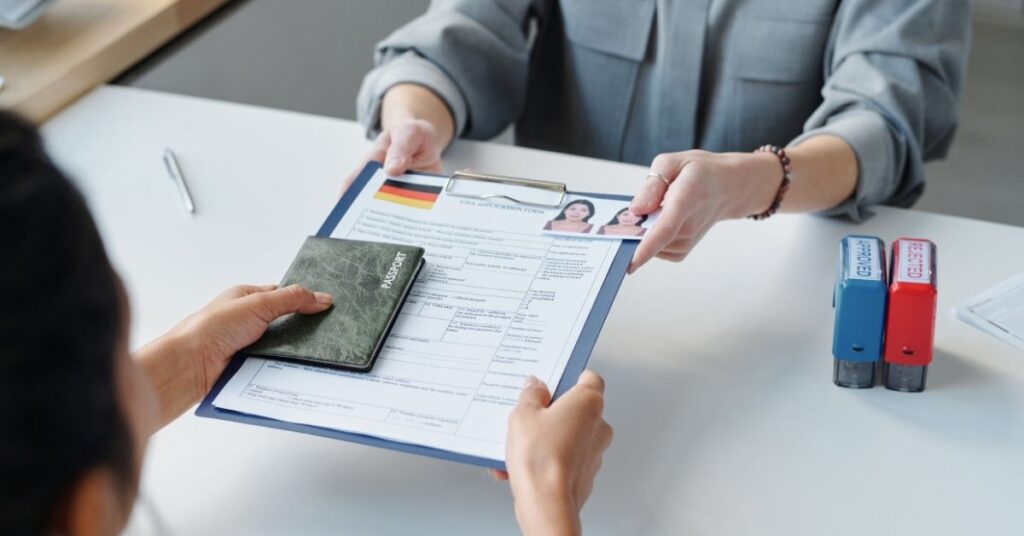
Sebelum Keberangkatan
Minggu sebelumnya: Periksa kembali keabsahan paspor setiap orang dan halaman kosongnya. Buatlah keputusan e-VOA vs VOA bandara berdasarkan rencana perjalanan Anda. Cetaklah akta kelahiran dan surat persetujuan jika diperlukan.
48 jam sebelumnya: Serahkan Kartu Kedatangan Seluruh Indonesia untuk setiap anggota keluarga. Aplikasi ini bisa saja rewel, jadi jangan menunggu sampai Anda naik ke pesawat.
Saat check-in di bandara: Pastikan semua orang menunjukkan tiket pulang pergi. Maskapai penerbangan terkadang memeriksa persyaratan masuk sebelum mengizinkan Anda naik ke pesawat.
Memahami retribusi pariwisata Bali: Ada retribusi pariwisata yang terpisah di Bali (dan mungkin juga di daerah lain). Ini berbeda dengan biaya visa Indonesia. Retribusi pariwisata di Bali biasanya sebesar Rp 150.000 per orang dan dibayarkan secara terpisah. Periksa peraturan yang berlaku sebelum Anda pergi, tapi jangan terlalu stres. Biasanya biayanya kecil dan tertera dengan jelas untuk persyaratan visa Bali.
Di Bandara dengan Anak-Anak
Anda telah mendarat. Kau lelah. Anak-anak lelah. Inilah cara untuk bergerak secara efisien.
Jika Anda memiliki e-VOA: Langsung menuju ke pos pemeriksaan kantor imigrasi. Lewati konter pembayaran sepenuhnya. Tunjukkan persetujuan e-VOA dengan kode QR dan paspor Anda kepada petugas imigrasi.
Jika Anda mendapatkan VOA pada saat kedatangan: Temukan konter pembayaran VOA terlebih dahulu. Anda biasanya dapat membayar untuk beberapa anggota keluarga dalam satu transaksi menggunakan kartu kredit Mastercard atau JCB yang masih berlaku. Katakan kepada mereka bahwa Anda membayar untuk seluruh anggota keluarga Anda. Siapkan semua paspor.
Di pos pemeriksaan imigrasi: Serahkan semuanya bersama-sama. Serahkan semua paspor keluarga Anda sekaligus sehingga petugas memahami bahwa Anda adalah satu kesatuan yang bepergian bersama. Hal ini sangat membantu jika Anda memiliki nama keluarga yang berbeda atau jika anak-anak Anda belum terlihat seperti Anda.
Kiat-kiat praktis yang benar-benar membantu:
Simpan semua dokumen perjalanan dalam satu folder atau amplop besar. Membongkar-bongkar empat tas yang berbeda saat balita Anda kabur bukanlah hal yang menyenangkan.
Tangkap semua yang penting dan pastikan tangkapan layar tersebut berfungsi secara offline. Wifi bandara adalah sampah.
Pikirkan tentang manajemen antrean sebelum Anda tiba di sana. Kamar mandi sebelum antrean. Botol-botol air terisi. Makanan ringan yang dapat diakses. Antrian VOA dan imigrasi dapat memakan waktu 20 hingga 45 menit, tergantung pada berapa banyak penerbangan yang baru saja mendarat.
Setelah Pemeriksaan Paspor
Anda berhasil lolos. Langkah terakhir: periksa stempel entri Anda.
Lihatlah stempel pada setiap paspor. Konfirmasikan tanggal masuk dan tanggal berakhirnya visa Anda. Visa on arrival VOA memberi Anda waktu 30 hari sejak kedatangan. Pastikan visa ini ditandai dengan benar untuk setiap orang. Visa sekali masuk ini berarti Anda tidak dapat pergi dan kembali dengan visa yang sama.
Jika Anda melewati gerbang elektronik alih-alih mendapatkan stempel fisik, Anda seharusnya mendapatkan konfirmasi cetak. Simpanlah dengan aman. Anda harus membuktikan tanggal masuk Anda jika Anda memperpanjang atau jika ada pertanyaan.
Tinggal Lebih Lama Dari 30-60 Hari: Pilihan untuk Keluarga
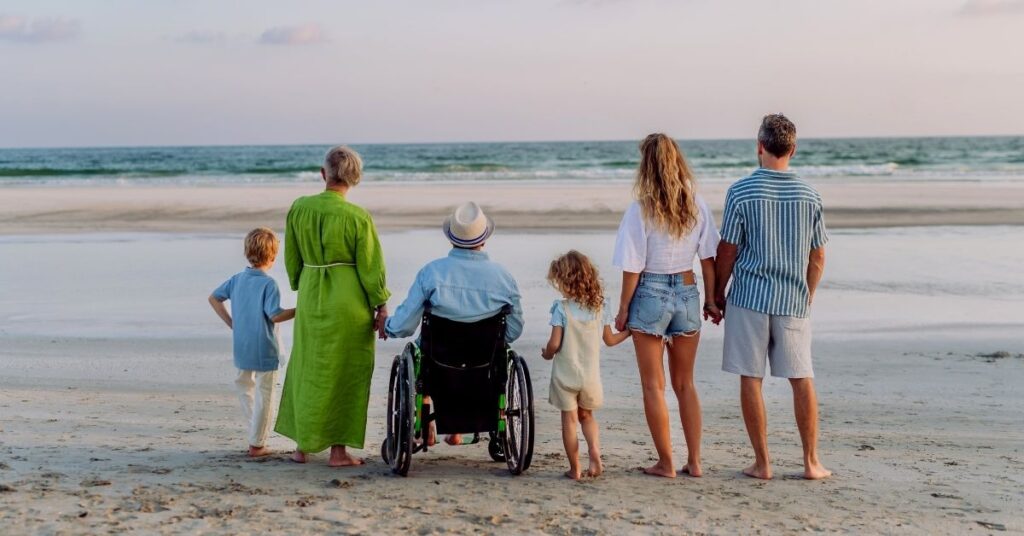
Memperpanjang VOA Satu Kali (Semua Anggota Keluarga)
Anda bisa mendapatkan perpanjangan visa pada saat kedatangan satu kali selama 30 hari. Itu adalah batas maksimum. Anda tidak dapat memperpanjang dua kali. Anda tidak dapat memperpanjang tanpa batas waktu.
Langkah cerdas: sinkronkan tanggal perpanjangan visa Anda. Jangan sampai visa satu orang habis masa berlakunya pada tanggal 15 dan visa orang lain habis pada tanggal 22. Itu hanya akan menimbulkan kesalahan. Ajukan permohonan perpanjangan bersama-sama di kantor imigrasi setempat agar visa semua orang tetap selaras.
Perpanjangan dilakukan di kantor imigrasi di Indonesia. Anda tidak dapat melakukannya secara online dari rumah sebelum melakukan perjalanan. Anda harus datang langsung ke kantor imigrasi setempat, membayar biaya perpanjangan, dan menunggu prosesnya. Dengan membawa anak-anak, hal ini membutuhkan waktu. Rencanakan dengan baik. Beritahukanlah kepada staf bahwa Anda adalah keluarga yang bepergian bersama.
Ketika VOA adalah Alat yang Salah
Beberapa keluarga membutuhkan waktu lebih dari 60 hari. Mungkin Anda melakukan perjalanan yang panjang dan lambat. Mungkin Anda ingin kembali beberapa kali dalam setahun. Mungkin Anda menggabungkan wisata dengan pertemuan bisnis atau kunjungan pemerintah.
VOA tidak dibuat untuk itu. Inilah yang harus Anda perhatikan:
Visa Turis: Memberi Anda 60 hari pada awalnya dengan opsi untuk memperpanjang beberapa kali. Lebih mahal dan lebih banyak dokumen di awal melalui proses aplikasi visa, tetapi jauh lebih baik untuk kunjungan keluarga yang lebih lama.
Visa turis beberapa kali masuk: Untuk keluarga yang ingin datang dan pergi. Anda dapat memasuki Indonesia beberapa kali dalam beberapa bulan tanpa mengajukan permohonan ulang untuk setiap perjalanan. Pembatasan visa sekali masuk VOA tidak berlaku untuk rencana perjalanan ini.
Opsi jangka panjang: Jika salah satu orang tua bekerja di Indonesia, berbisnis, atau berinvestasi di Indonesia, ada visa tanggungan untuk pasangan dan anak-anak. Itu adalah proses yang berbeda melalui jalur imigrasi resmi dan di luar apa yang kami bahas di sini, tetapi ketahuilah bahwa opsi-opsi tersebut ada jika situasi keluarga Anda lebih kompleks.
Intinya: jika Anda berpikir “kami mungkin ingin tinggal lebih lama” bahkan sebelum Anda memesan penerbangan, jangan langsung memilih VOA. Lihatlah opsi-opsi lain ini sekarang. Mengganti jenis visa ketika Anda sudah berada di Indonesia cukup rumit dan tidak selalu memungkinkan menurut hukum Indonesia.
Skenario Kehidupan Nyata (Agar Anda Tidak Salah Tebak)
Skenario 1: Keluarga Beranggotakan Empat Orang, 21 Hari, Semua Paspor Memenuhi Syarat
Anda, pasangan Anda, dan dua anak berusia 8 dan 4 tahun. Semua orang memiliki paspor. Anda akan pergi selama tiga minggu untuk tujuan wisata.
Apa yang harus dilakukan: Baik e-VOA sebelum Anda pergi atau visa reguler pada saat kedatangan di bandara. Keduanya bekerja dengan sempurna. Biayanya Rp 500.000 untuk empat orang. Bawalah paspor semua orang yang masih berlaku selama enam bulan, bukti tiket pulang pergi dengan keempat nama tersebut, dan akta kelahiran untuk berjaga-jaga. Jika berkunjung ke Bali, anggarkan juga biaya untuk visa pariwisata Bali. Itu saja. Mudah dan bebas stres.
Skenario 2: Ibu Tunggal, Dua Anak, Nama Keluarga Berbeda
Anda adalah seorang ibu yang bercerai yang bepergian dengan anak-anak Anda. Anak-anak menggunakan nama belakang ayah mereka. Anda memiliki nama gadis Anda kembali.
Apa yang harus dibawa: Akta kelahiran yang menunjukkan bahwa Anda adalah ibunya. Surat persetujuan yang diaktakan oleh notaris dari sang ayah yang menyatakan bahwa anak-anak dapat melakukan perjalanan internasional bersama Anda. Dokumentasi hak asuh jika Anda memiliki hak asuh penuh. Visa Indonesia itu sendiri sederhana, tetapi siapkan dokumentasi ini karena petugas imigrasi perlu memverifikasi hubungan keluarga jika nama tidak cocok.
Skenario 3: Kakek dan Nenek Terbang Bersama Cucu
Nenek dan kakek mengajak cucu-cucunya dalam perjalanan khusus untuk kunjungan keluarga. Orang tua tinggal di rumah.
Apa yang Anda butuhkan: Surat persetujuan yang diaktakan oleh notaris dari kedua orang tua untuk setiap anak. Surat-surat tersebut harus mencantumkan nama lengkap, nomor paspor, tanggal perjalanan, dan izin eksplisit bagi kakek-nenek untuk bepergian ke luar negeri bersama anak-anak. Bawalah juga salinan paspor orang tua. VOA bisa digunakan untuk visa yang sebenarnya, namun dokumentasi yang membuktikan persetujuan sangat penting untuk memasuki Indonesia secara legal.
Skenario 4: Paspor Campuran, Salah Satu Orang Tua Tidak Memenuhi Syarat VOA
Ayah memiliki paspor Inggris (memenuhi syarat VOA). Ibu memiliki paspor dari negara yang tidak termasuk dalam daftar negara yang memenuhi syarat. Anak-anak memiliki kewarganegaraan ganda, tetapi Anda menggunakan paspor yang tidak memenuhi syarat VOA untuk mereka.
Masalahnya: Anda tidak bisa hanya melakukan VOA untuk ayah dan memikirkan ibu dan anak-anak nanti. Seluruh keluarga perlu merencanakan siapa saja yang memiliki persyaratan masuk yang paling ketat. Ibu perlu mengajukan visa turis melalui kedutaan atau sponsor sebelum melakukan perjalanan melalui proses pengajuan visa resmi. Ini bisa memakan waktu berminggu-minggu. Anda tidak bisa berpisah di kantor imigrasi.
Perbaikan: Setiap orang mungkin harus mendapatkan jenis visa yang sama dengan yang dibutuhkan ibu. Atau, jika anak-anak memiliki kedua paspor, gunakan paspor mereka yang memenuhi syarat VOA, dan ibu mengurus visa terpisahnya terlebih dahulu melalui saluran imigrasi resmi. Jangan datang ke bandara dengan harapan dapat mengetahui hal ini. Risiko ditolak masuk adalah nyata.
Kesalahan Umum yang Sering Dilakukan Keluarga (dan Cara Menghindarinya)

Dengan asumsi anak-anak tidak memerlukan visa. Kami sudah mengatakannya tiga kali karena keluarga selalu mengacaukannya. Bayi membutuhkan visa. Balita membutuhkan visa. Remaja membutuhkan visa. Jika mereka memiliki paspor, mereka membutuhkan visa untuk masuk ke Indonesia.
Lupa membawa tiket pulang untuk semua penumpang. Anda memesan penerbangan pulang untuk keluarga, tetapi entah bagaimana hanya nama orang tua yang muncul di konfirmasi. Maskapai penerbangan dan petugas imigrasi ingin memastikan bahwa setiap orang memiliki cara untuk meninggalkan Indonesia. Periksa konfirmasi pemesanan Anda dengan cermat.
Membiarkan masa berlaku paspor di bawah enam bulan. Kau sudah memeriksanya enam bulan yang lalu. Bagus. Masa berlaku paspor anakmu akan habis empat bulan lagi? Itu masalah. Periksa kembali setiap paspor anggota keluarga Anda sebelum terbang.
Mendapatkan e-VOA dari situs web palsu. Situs-situs penipuan tersebut memiliki peringkat tinggi di Google. Situs-situs tersebut terlihat seperti situs web imigrasi resmi. Padahal tidak. Pastikan Anda berada di portal pemerintah Indonesia yang sebenarnya. Jika situs tersebut menagih Anda lebih dari Rp500.000 per orang untuk biaya layanan, kemungkinan besar situs tersebut menipu Anda.
Tidak menyinkronkan tanggal kedaluwarsa visa. Anda tiba dengan penerbangan yang berbeda, atau Anda masuk pada waktu yang berbeda, dan sekarang visa kedatangan Anda kedaluwarsa pada hari yang berbeda. Mengkoordinasikan perpanjangan di kantor imigrasi setempat dan keberangkatan menjadi berantakan. Cobalah untuk masuk bersamaan sehingga jam 30 hari Anda dimulai bersamaan.
Tinggal lebih lama “hanya beberapa hari” bersama anak-anak. Mungkin putrimu jatuh sakit. Mungkin Anda lupa waktu. Melebihi batas waktu tinggal visa Anda adalah tindakan ilegal menurut hukum Indonesia dan dapat dikenai denda, kemungkinan penahanan, dan larangan masuk kembali ke Indonesia. Jangan ambil risiko. Jika Anda membutuhkan lebih banyak waktu, perpanjanglah di kantor imigrasi setempat sebelum masa berlaku visa Anda habis atau tinggalkan Indonesia tepat waktu.
Jenis dan tujuan visa yang membingungkan. Visa on arrival khusus untuk tujuan wisata, kunjungan singkat, kunjungan keluarga, dan kegiatan serupa. Visa ini bukan untuk bisnis, perawatan medis, kunjungan pemerintah, atau membeli barang. Menggunakan jenis visa yang salah untuk tujuan Anda yang sebenarnya dapat menyebabkan masalah dengan petugas imigrasi.
Pertanyaan yang Sering Diajukan: Visa Saat Kedatangan untuk Keluarga di Indonesia
Apakah bayi memerlukan visa?
Ya, jika bayi Anda memiliki paspor dan kewarganegaraannya memerlukan VOA, mereka memerlukan visa Indonesia sendiri. Usia tidak menjadi masalah. Indonesia tidak memberikan izin masuk gratis untuk bayi. Setiap warga negara asing membutuhkan dokumentasi yang tepat.
Dapatkah saya membayar VOA untuk seluruh keluarga saya dengan satu kartu?
Biasanya ya. Di loket pembayaran VOA, katakan kepada mereka bahwa Anda membayar untuk beberapa orang. Siapkan semua paspor. Sebagian besar bandara menangani pembayaran keluarga dalam satu transaksi dengan kartu kredit Mastercard atau JCB yang masih berlaku. Total biaya visa adalah Rp500.000 dikalikan jumlah orang.
Dapatkah orang tua yang berpisah atau bercerai bepergian dengan anak-anak?
Ya, tetapi bawalah dokumentasi. Jika Anda adalah orang tua pemegang hak asuh, bawalah surat hak asuh. Jika Anda berbagi hak asuh, bawalah surat persetujuan yang diaktakan oleh notaris dari orang tua lainnya. Petugas imigrasi perlu memverifikasi bahwa Anda memiliki izin untuk membawa anak-anak keluar negeri untuk masuk ke Indonesia secara legal.
Bagaimana jika nama keluarga kami tidak cocok?
Bawalah akta kelahiran atau dokumen pendaftaran keluarga yang membuktikan hubungan tersebut. Hal ini sering terjadi pada orang tua yang bercerai, orang tua yang menikah lagi, atau keluarga yang anak-anaknya menggunakan nama belakang salah satu orang tua. Siapkan saja buktinya untuk petugas imigrasi.
Apa yang terjadi jika salah satu anggota keluarga tinggal melebihi batas waktu tinggal?
Mereka akan menghadapi denda, kemungkinan penahanan di bandara, dan kemungkinan larangan untuk kembali ke Indonesia. Konsekuensinya tidak hanya menimpa orang yang tinggal melebihi batas waktu tinggal, tetapi juga menimbulkan stres dan penundaan bagi seluruh keluarga Anda yang ingin meninggalkan Indonesia. Setiap orang harus keluar tepat waktu atau memperpanjang secara legal di kantor imigrasi setempat sebelum masa berlaku visa mereka habis.
Apa perbedaan antara visa turis dan visa on arrival?
Visa turis memerlukan aplikasi terlebih dahulu melalui jalur imigrasi Indonesia dan biasanya mengizinkan masa tinggal yang lebih lama dengan beberapa kali perpanjangan. Visa on arrival VOA lebih sederhana, tersedia di bandara untuk negara-negara yang memenuhi syarat, tetapi terbatas hingga 30 hari ditambah satu kali perpanjangan 30 hari. Pilihlah berdasarkan berapa lama Anda akan tinggal.
Dapatkah saya menggunakan paspor darurat atau paspor sementara untuk VOA?
Ya, selama itu adalah paspor yang masih berlaku yang dikeluarkan oleh pemerintah Anda. Apakah Anda memiliki paspor biasa, paspor sementara, paspor darurat, dokumen perjalanan darurat, atau bahkan paspor asing atau titre de voyage, persyaratan utamanya adalah paspor tersebut haruslah paspor yang masih berlaku setidaknya enam bulan dan diakui oleh imigrasi Indonesia.
Siap Mengajukan atau Memperpanjang Visa Anda?
Biarkan spesialis visa kami menangani aplikasi Anda.


